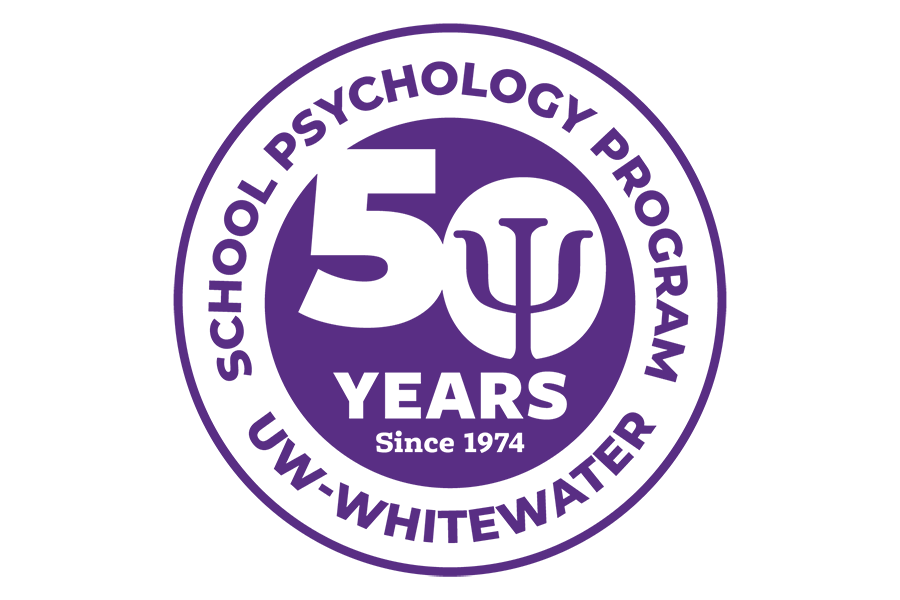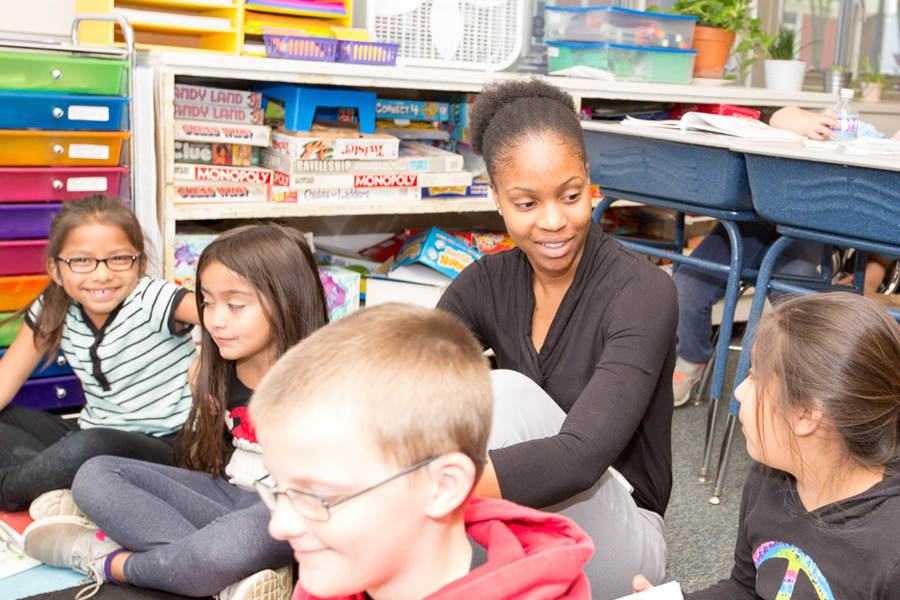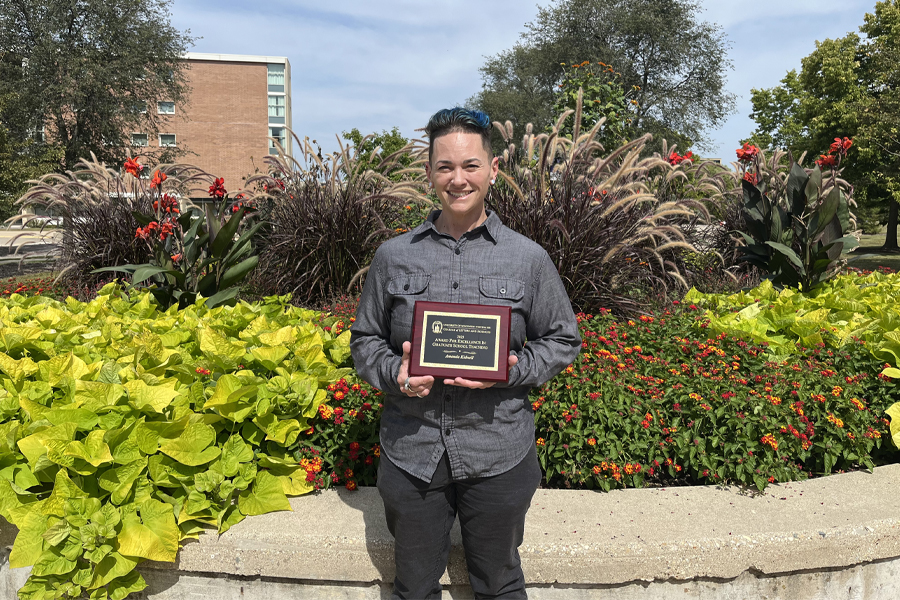SCHOOL PSYCHOLOGY
Master's and Education Specialist Degree Programs
When you pursue the degrees you need to become a school psychologist, you’re committed to making a difference in the lives of children and to being a vital member of a school community. The University of Wisconsin-Whitewater’s school psychology programs will help you understand, support, and improve school systems. You’ll get two degrees — an MSE and an EdS — on your way to championing school communities whose work supports students’ ability to learn and teachers’ ability to teach.
UW-Whitewater’s school psychology program is a three-year, full-time sequence of coursework and field experiences that prepares students with the knowledge, skills, and dispositions necessary to acquire school psychologist jobs. Students in the program apply their knowledge of evidence-based and culturally responsive practices to address educational inequities affecting children and youth in their communities. Our graduates are school leaders and advocates who help children succeed academically, behaviorally, and socio-emotionally.
School psychologists are in demand. According to the U.S. Bureau of Labor Statistics, psychologist jobs are expected to grow at a 6 percent rate between 2024-34 (faster than average) with a median annual salary of $94,310. A school psychologist is ranked sixth on the 2025 U.S. News and World Report’s Best Science Jobs list.
CAN WE BRAG A LITTLE?
Why study School Psychology at UW-Whitewater?

Accredited nationally and in Wisconsin
UW-Whitewater’s program is fully accredited by the National Association of School Psychologists, ensuring high quality standards, relevant curriculum, engaging field experiences as well as enhanced credentialing and employment opportunities.
Learn more about our accreditation and student outcomes data »
In addition, the program has additional approval from the Wisconsin Department of Public Instruction (DPI). If you are seeking licensure outside of Wisconsin, please review the information on license reciprocity. Upon internship completion, students may apply for the Nationally Certified School Psychologist (NCSP) credential. This credential is achieving growing recognition among state school psychology licensing boards and allows for reciprocal certification in selected states outside of Wisconsin.
Affordable education
We know you want to spend your education dollars wisely. UW-Whitewater combines quality education at an affordable price. Looking for ways to offset the cost of the graduate program? UW-Whitewater offers assistantships, employment, grants and loans to help ease your journey.
Explore funding and financial aid information »
Scholarships and fellowships
The UW-Whitewater School Psychology program has partial scholarships and fellowships available for both first- and second-year students — the Barbara Ann Hersko Scholarship, Fellowships and the Song Family Scholarship. Information about these opportunities are explained once a student has entered the program. Accepted students are also eligible for a variety of Wisconsin School Psychologists Association (WSPA) scholarships.
What our School Psychology students do
Hands-on learning
A great location
Conveniently located in southern Wisconsin within one hour of both Madison and Milwaukee, UW-Whitewater provides ample opportunities for students to secure valuable field experiences that will help them succeed in their school psychologist jobs.
Field experiences
Students engage in field experiences each year that support their learning outside of their courses. You could shadow practicing school psychologists to experience how the role of the school psychologist differs depending on the district and student needs. Or participate in the Sidekicks for Success Student Mentoring Program with students in the local elementary schools.
Students also have the opportunity to practice the use of curriculum-based assessment measures with children in the school setting, providing academic intervention support. Students in their second year complete a 600-hour supervised practicum in a school district. Students in the third year complete a 1,200-hour, full-time internship in a school district.
On-campus jobs and internships
Students in the School Psychology program have served as graduate assistants and interns for a number of on-campus offices that enhance real-world experiences in relationship development, project management, and mentoring.
- Department of Psychology
- LIFE (Learning Is For Everyone): UW-Whitewater students between the ages of 18-25 who have an intellectual disability are part of the LIFE program, which provides a complete college experience.
- Campus Tutorial Services: A free service for all UW-Whitewater students that provides academic tutoring services in several subjects. The center is College Reading and Learning Association certified.
- Office of Academic Assessment: Working within UW-Whitewater’s Institutional Research, Assessment and Planning (IRAP) department, the office leads projects that support continuous improvement of student learning.
WHAT OUR STUDENTS SAY
Frequently asked questions
Strong applicants typically have a range of experiences working with children, particularly with vulnerable and diverse student populations. Volunteer or work experiences in the school setting are also valuable to list on your application. Familiarity with current research practices and/or applied research experiences are also encouraged.
Due to the program’s structure, students typically attend classes around 4 p.m. and are able to work during their first year. While the second-year schedule changes, students are able to work outside of practicum and classes if they choose.
UW-Whitewater is uniquely positioned to provide necessary services for students with disabilities, and the School Psychology program is dedicated to providing all students with a superior graduate education regardless of ability.
Once admitted into the program we suggest beginning your first two courses online in the summer. Doing so will allow you to complete your master’s degree in May and progress to the Ed.S. degree sequence the following summer. If you are unable to complete these courses in the first summer, the courses can be completed in another summer semester.
What our graduates do
Jobs: What can you do with an MSE and EdS in School Psychology?
Here are some of the places where our recent graduates have been hired as school psychologists:
- Harlem District 122 (IL)
- School District of Oconomowoc
- Sparta Area School District
- Milwaukee Public Schools
- School District of Belleville
- Stoughton Area School District
- Twin Lakes School District
- Fond du Lac School District
- School District of Waukesha
- D.C. Everest Area School District
- West Bend School District
- Waterford Union High School
- School District of Horicon
- School District of Baraboo
- Waunakee Community School District
- Swallow School District
- Sun Prairie Area School District
- Poudre School District (Fort Collins, CO)
- Jordan Public Schools (MN)
- Madison Metropolitan School District
- Verona Area School District
- Oconomowoc Area School District
- West Bend School District
Our School Psychology faculty
Our faculty include licensed clinical psychologists, school psychologists and scholars with decades of experience. Continual efforts by our instructors to be well-informed and responsive to an ever-changing educational climate ensure that our graduates remain adaptive and place the children’s educational, behavioral, and psychological well-being at the forefront of their work.
Research interests of our faculty are wide and deep, including:
- evidence-based interventions in educational settings
- school violence
- adolescent and emerging adult development
- mental health and mental health equity
- family-school collaboration
- bilingual school psychology
 Mae Anderson
Mae Anderson
Graduate Assistant
 Maddie McBride
Maddie McBride
Graduate Assistant
 V. Rienks
V. Rienks
Graduate Assistant
 Katie Carr
Katie Carr
Graduate Assistant
 Emily McDaniels
Emily McDaniels
Graduate Assistant
 Lindsey Stugard
Lindsey Stugard
Graduate Assistant
Want to learn more about the School Psychology graduate program?
Christine Neddenriep | 262-472-1850 | neddenrc@uww.edu | ![]()
UW-Whitewater offers the following graduate degrees in School Psychology:
During the first year of the program, students participate in classroom instruction and select field experiences, completing 32 credits of graduate coursework in psychology and education. At the end of this year, students complete a comprehensive examination in the form of a portfolio to fulfill the requirements needed to obtain their MSE in School Psychology.
Summer
Reading 764: Foundations of Reading (3 Credits)
EdFound 710: Education in a Pluralistic Society (3 Credits)
Fall
Psych 620: Foundations of Professional School Psychology (3 Credits)
Psych 715: Research Design & Program Assessment (3 Credits)
Psych 740: Assessment I - Achievement and Progress Monitoring (3 Credits)
Psych 785: Advanced Child Development (3 Credits)
Psych 792: Field Placement in School Psychology (1 Credit)
Spring
Psych 724: Learning in Educational Contexts (3 Credits)
Psych 745: Assessment III - Intellectual Functioning (3 Credits)
Psych 746: Psychopathology of Childhood and Adolescence (3 Credits)
Psych 770: Assessment II - Personality and Behavior (3 Credits)
Psych 792: Field Placement in School Psychology (1 Credit)
Upon attaining their MSE, students begin the Education Specialist Degree (EdS) sequence, known as the practicum year. During this year, students complete a 600-hour (part-time) practicum under the supervision of a licensed school psychologist. Practicum allows students to apply what they have learned during their first year while they continue to learn about the field through additional graduate coursework. At the end of the year, students take the ETS Praxis-II Exam in School Psychology and obtain a paid internship position for the following year. In addition, students produce a portfolio that details the coursework and practicum experiences they completed during their second year.
Summer
Psych 680: School Violence and Crisis Management (3 Credits)
Psych 755: Counseling Skills & Theory for School Psychology (3 Credits)
Psych 762: Academic Interventions (3 Credits)
Psych 768: Behavior Therapy in the School (3 Credits)
Fall
Psych 793: Practicum in School Psychology including Seminar (6 Credits)
Psych 769: Consultation and Prevention (3 Credits)
Psych 797: Specialist Project Research (1 Credit)
Speed 700: Theoretical Foundations in Special Ed. (3 Credits)
Spring
Psych 793: Practicum in School Psychology including Seminar: Cultural Issues in the Schools (6 Credits)
Psych 766: Cognitive Behavioral Therapy with Children and Adolescents (3 Credits)
Psych 787: Social Context and Diversity in the School Setting (3 Credits)
Psych 797: Specialist Project Research (1 Credit)
The third year in the program is referred to as the internship year. At this point, students have completed all the graduate coursework and field experiences necessary to practice independently as school psychologists with minimal supervision. Students begin their first year of practice as school psychologists completing a 1,200-hour (full-time) internship. Following the completion of their internship year, completion of a final portfolio review, and their specialist project, students obtain their Education Specialist Degree (Ed.S) and may apply for the Nationally Certified School Psychologist (NCSP) credential.
Fall
Psych 795: Internship in School Psychology (3 Credits)
Spring
Psych: 795 Internship in School Psychology (3 Credits)
Application Process: Step-by-Step
- Go to the Student Application Portal and create an account or log in. You will submit all of your materials here, as well as be able to check the status of your application. Please apply to the MSE program.
- Once in the Application Portal, you will need to complete:
- Initial questions to apply to the School of Graduate Studies
- Additional questions specific to the School Psychology program
- An "Autobiographical Statement" discussing relevant background information and an in-depth description of why you have chosen to pursue the field of school psychology.
- Three Letters of Recommendation — These usually consist of individuals who are familiar with your academic and personal qualifications for graduate preparation in school psychology. This might include current or former professors or work supervisors. You will submit the names and contact information of the individuals, who are writing and submitting your recommendation letters, on the Application Portal. The system will automatically send the reference an email with a link where they will be able to upload their recommendation letter. Please notify your references after you submit their information so they know to look for an email from the Application Portal. You will be able to monitor the status of your recommendation letters on the Application Portal.
- Transcripts — You will need to upload an unofficial copy of your transcripts within the portal. In addition, please request that an official copy of your transcripts be sent directly to the School of Graduate Studies at gradtranscript@uww.edu prior to your admittance to the program.
The application deadline for admissions is the 3rd Monday in January. All materials need to be submitted and received by that date for full consideration. The School Psychology MSE program begins in the summer term. See more deadline information for School Psychology MSE »
The School Psychology Admissions Committee will review applicants as they are received. Applicants will be informed by e-mail as to their status. The School Psychology program admits students only in the spring of the year for classes beginning the following summer term. Interviews will begin in later January with applicants whose materials are complete.
If you are interested in applying for a graduate assistantship, complete the application form by the February 15 deadline. For more information regarding graduate assistantships, please see Financial Assistance Opportunities.
Admission prerequisites
- An overall undergraduate grade point average of at least a 3.00 (on a 4.00 scale) is required.
- Students must demonstrate, at a minimum, 12 credits of undergraduate or graduate coursework in psychology which include study in the three areas of:
- Child/adolescent psychology or lifespan development,
- Abnormal psychology or psychopathology, and
- Statistics
Additional preparation in the areas of neuroscience, behavior modification, personality theory, and general or special education are highly recommended.
Note: We no longer require GRE scores for admission to our program.
Mission statement
The mission of the UW-Whitewater School Psychology Program is to prepare school psychologists who apply the principles of empirical science and culturally responsive practice to the problem-solving process. We stress the need for school psychologists to operate through a social justice lens, addressing systemic inequities by advocating for all children in their work. With this understanding, school psychologists proactively foster collaboration between schools and families, using strength-based, empowering language to promote educational outcomes. We equip our graduates with the tools and training needed to support children’s academic skills, mental and behavioral health, and social-emotional learning. Continual efforts to be well-informed and responsive to an ever-changing educational climate ensure that our graduates remain adaptive and place the children’s educational, behavioral, and psychological well-being at the forefront of their work.
Training Model
The program conforms to the professional scientist-practitioner training model, with a strong emphasis placed on the maintenance of scientific rigor in the applied setting. Students are educated to see themselves as applying both the principles of empirical science and the skills of clinical sensitivity and insight to the problem-solving process in the school setting. While the training essentially represents a "delivery of service" model, students are provided with the curricular background to produce as well as effectively consume research in the field. This includes using knowledge of research to apply and evaluate evidence-based practices within the field through field experiences and completion of a specialist project in the program.
Resources
Performance-Based Assessment [PDF] »
Policies and Procedures Handbook [PDF] »
Internship Handbook [PDF] »
Practicum Handbook [PDF] »
NASP and Wis. Pupil Service Standards Training Matrix [PDF] »












